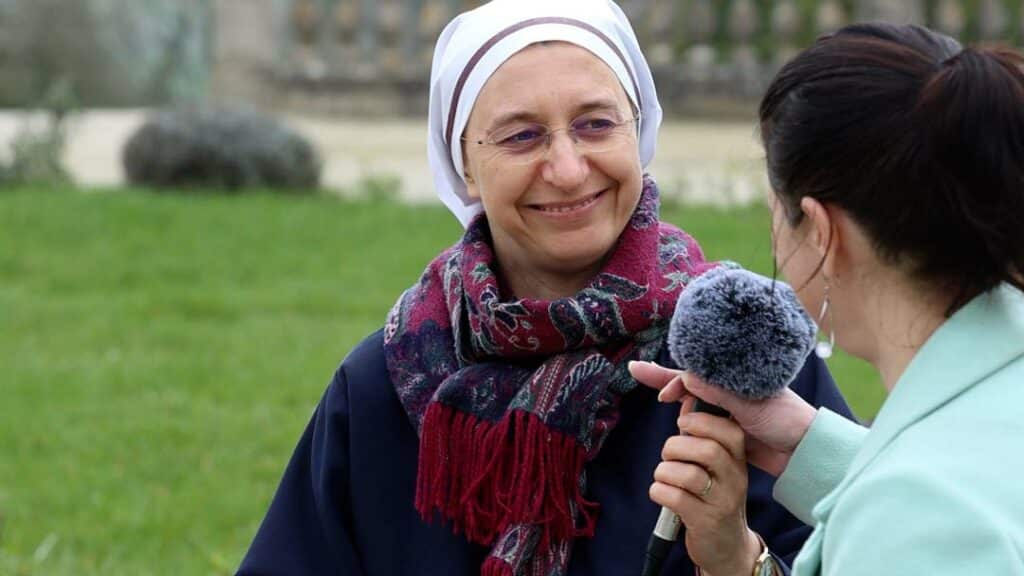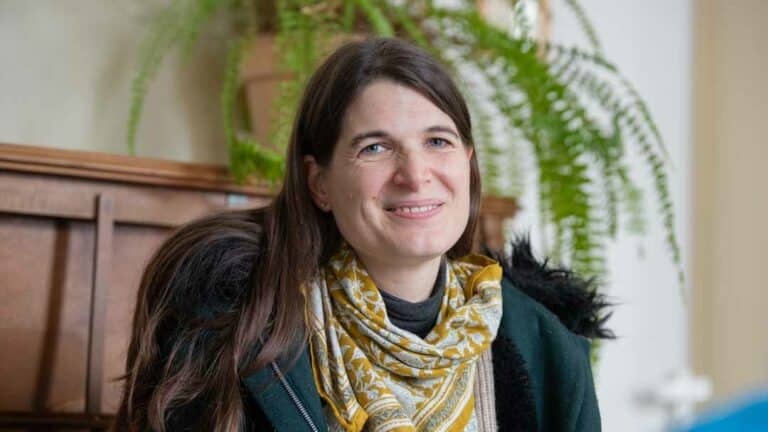The French poet Lamartine wrote: “One being is missing and every place feels empty”. Those words have a profound echo for those who experience absence, silence, the void left by someone they loved. Is it really possible to achieve the grieving process? The phrase is common, but is it fair ? What is the reality behind it?
We discussed the subject with Sister Cécile, the prioress of the Nouvelle Alliance community. This interview was completed for the program Sanctuaires normands on RCF Orne-Calvados-Manche.
“Grieving affects your being, not only what you do or don’t do'”
The phrase “achieving one’s grieving process” may suggest that there is a method, a quick solution to apply. Yet, as Sr Cécile stresses out, “going through mourning is not a task to perform. It is an ordeal that affects the whole being.” All the dimensions – physical, emotional, psychological, intellectual and spiritual – get shattered.”
Tiredness, inner disorder, questioning about the meaning of life or the emotional quiver that shakes us are all signs that grieving does not resolve itself thanks to our efforts of out of one’s will. “It’s a crossing, an inner journey.”
Grieving takes time
There is not a definite schedule for grieving. Sr Cécile insists: “It is not a linear journey with boxes to tick. People move forward, then backwards or go back.” Some of the steps as described by psychologists, such as denial, anger, sadness, acceptance, may help navigate it. Yet they do not necessarily follow each other in a fixed sequence.
Time is a valuable ally. You have to accept that reconstruction will be gradual. “There is no miracle recipe”, she says. “Over time, everyone will find the little bridges allowing them to go from one stage to another.”
At Montligeon : welcoming, listening, counselling
At the Montligeon shrine, the bereaved find a place where they are welcomed and listened to. “We offer a space where people can express their suffering without being judged, explains Sister Cécile. That’s essential, especially when life in the outer world quickly takes over, often leaving the bereaved in great isolation.”
After the first few weeks, where you often get a lot of support and company, comes a more lonely time. The real questions and the deeper pains start to arise then. So, listening becomes crucial at that particular time.
Sr Cécile also mentions the five major stages identified by Elisabeth Kübler-Ross: denial, anger, bargaining, sadness, acceptance and, for the believers, a final spiritual stage – offering. “Offering to God the deceased person and opening a new space within you to the loved one, both these initiatives are a way to recreate a communion in faith, different but quite real.”
When saying goodbye was not possible
The matter of a last farewell often comes up, particularly since the Covid period when many were deprived of these moments. Sister Cécile recognizes that the impossibility of seeing the body one last time or saying goodbye makes the mourning process more difficult.
However, “it’s never too late,” she says. As with forgiveness, we can always say thank you, I love you, I’m sorry, even after death.” She reminds us of the presence of the Virgin Mary, “at the hour of our death”, and that of our guardian angel, as signs of an invisible but real accompaniment.
When faith seems powerless
Even for believers, the pain of bereavement can trigger a spiritual crisis. Being angry with God, or stopping to believe at all are always possible. We mustn’t be ashamed of this, or feel guilty.”
“Expressing one’s suffering is already a major step.”
What if the process of grieving was never achieved?
A number of people claim that they never completely achieved the process of grieving, even years later. Is this normal? “It is”, replies Sr Cécile. Because pain is tied to love. The grieving process does not mean no longer suffering nor forgetting. “What changes is the intensity, the form of the pain. It may calm down, get more peaceful.
Referring to the risen Christ, still bearing the wounds of his Passion, she says: “They no longer bled, but he still had them.” Bereavement does not erase the memory, but it is called upon to transform itself into a less acute, softer wound.
A message of hope
Sister Cécile concludes with this quotation from Benedict XVI:
“It is never too late to touch the heart of another person. It is never unnecessary.”
This, she remarks, is the core of Christian hope. Even in the gloomliest trial, a path remains open.
Sister Cécile encourages us not to stay alone, but to surround ourselves with people who can listen sympathetically, without ready-made advice or hurtful injunctions.




